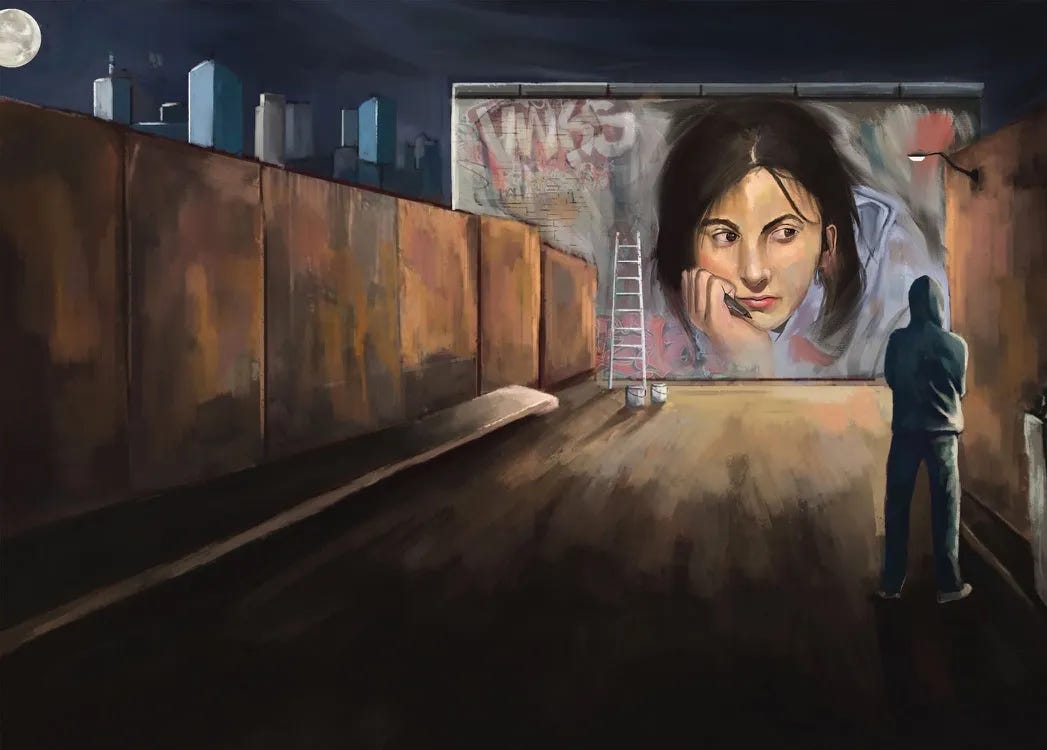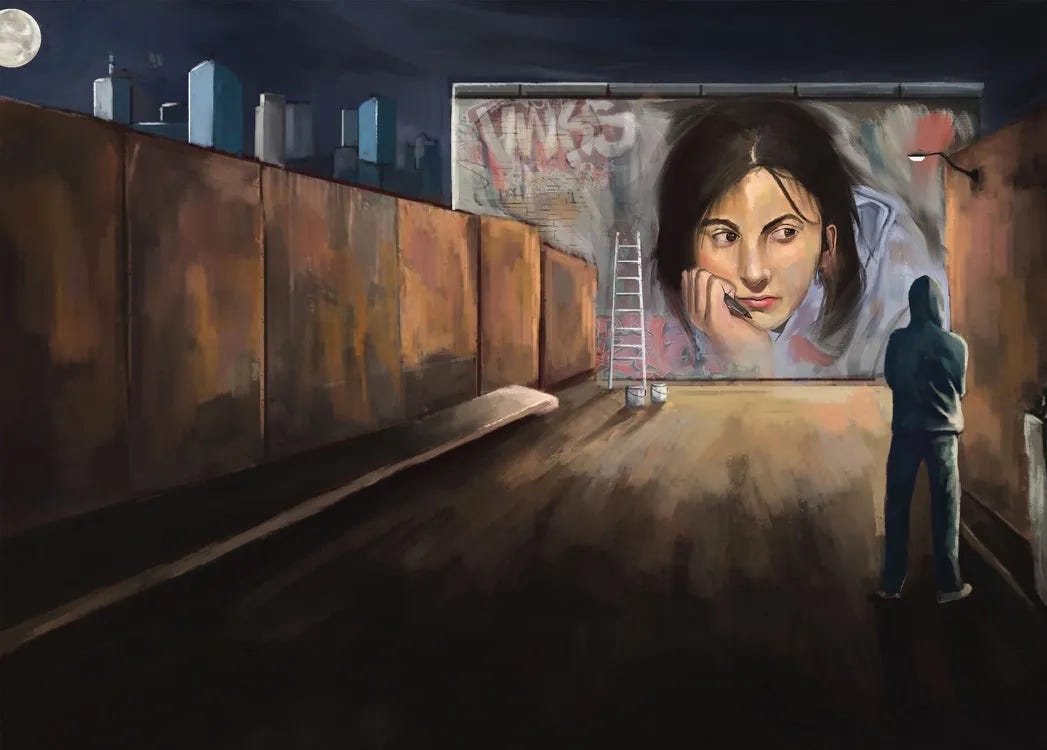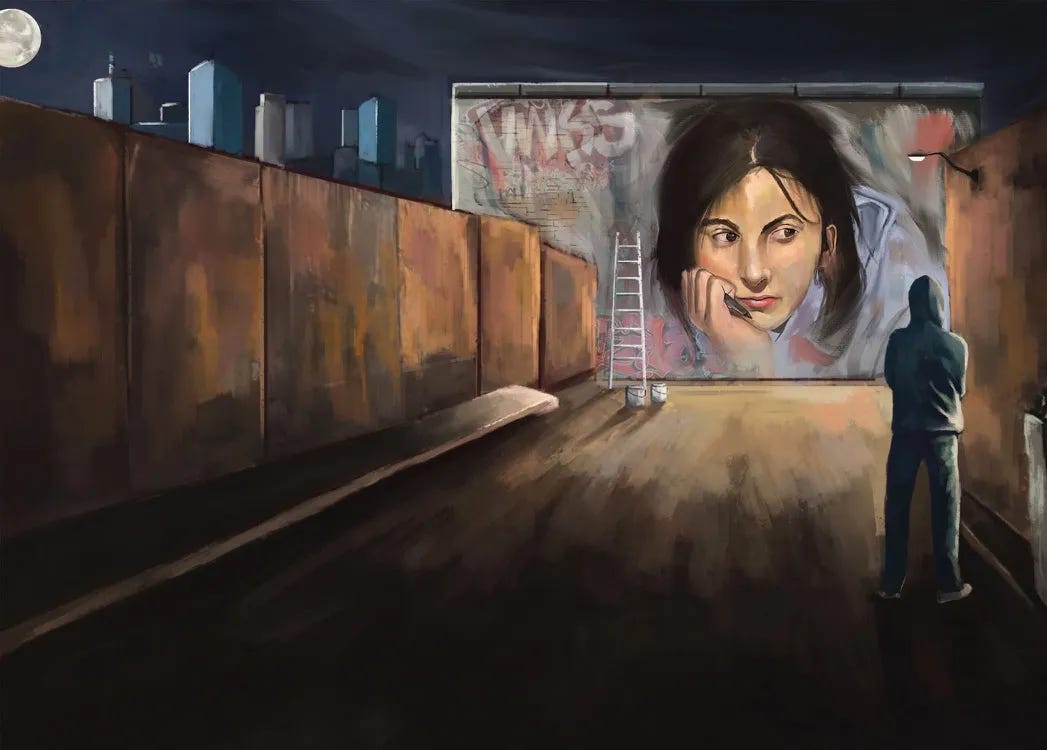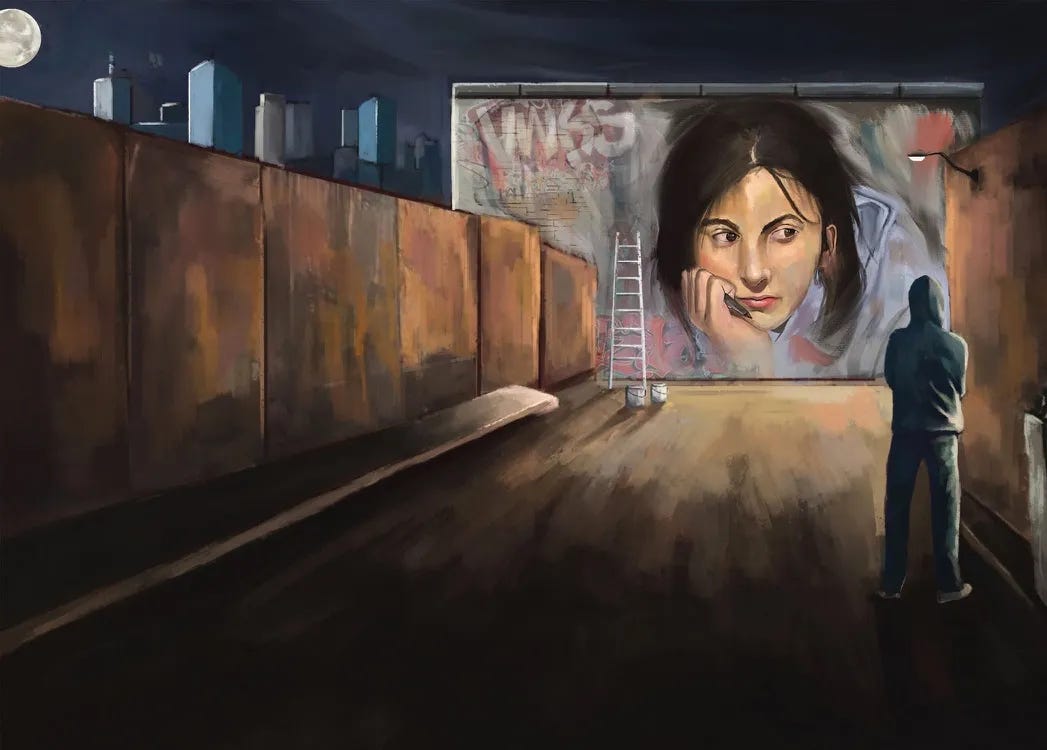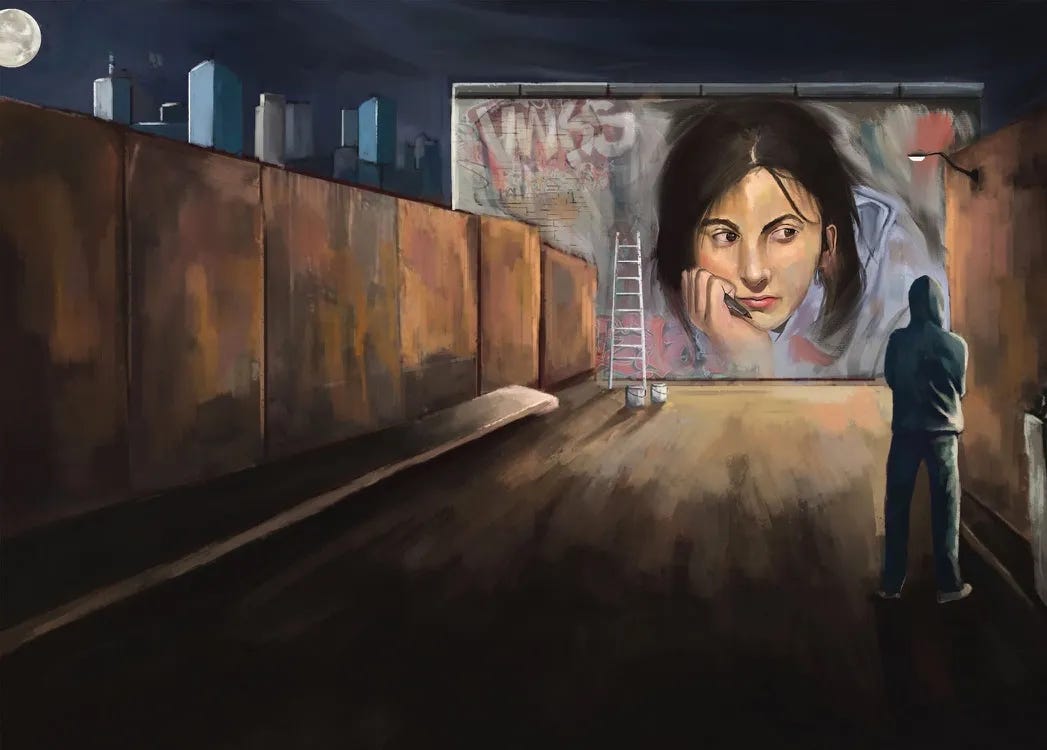Melbourne Cup Tuesday. A public holiday. No school. Late morning. Grandpa and I have just got home.
We’ve been at Ms McInness’s house.
I didn’t really want to go but Grandpa kind of insisted. Or at least made me feel that I should go. So I went.
Grandpa told me about the allegations against Ms McInness on Saturday, after he came back from his coffee with her. Zeph was still in bed in the spare room with the beginnings of the flu that has kept him there ever since, so it was just the two of us sitting in the spring sunshine in the garden outside Grandpa’s Shed. He told me there was some trouble brewing at school, that Ms McInness was being accused of unprofessional conduct around my story.
At first it was like he was telling me a story from another world. This is going to be hard to explain. I suppose it’s that for the past month or so I’ve sort of existed in a bubble. I’ve been living in the world of my story for much of it, cocooned away and not really noticing all that much about what’s been going on around me. I’ve been aware of Grandpa’s grumpiness around Zeph, I’ve been getting used to having Zeph around the house and have felt kind of proud of him as he’s been making an effort at school, or at least in Ms McInness’s class. And I guess I’ve been basking in the praise I’ve been getting about my story, praise from Ms McInness and Grandpa and Zeph, and even from some of the kids in the class who have heard me read out bits of it in class. But that’s about the extent of my awareness of external things.
So at first it was hard to take this thing seriously. How could allegations that sounded so ridiculous, so unconnected to anything real, actually be made? And how could they be taken so seriously that they’d been taken up by some professional body?
I’ve been talking with Grandpa about this over the past couple of days. He says that all kinds of poisonous plants flourish given the right kind of conditions. Personal ambitions get mixed up with jealousies and frustrations and insecurities and they’re the soil that grows this nonsense. And the plants can flourish, he says. They have to be taken seriously. They can spread and cause real damage.
I hear his words but it still doesn’t seem real. I feel a curious kind of numbness about the whole thing, like I should be feeling stuff but the feelings haven’t quite surfaced yet.
Yesterday, at school, I wondered what I should say to Ms McInness. But she wasn’t there. She was sick, we were told. Grandpa told me after school that she’d needed to take the day off.
And that she’d asked if he could visit her today.
‘Why do you want me to come?’ I asked.
Grandpa didn’t answer straight away. It’s always a good sign. It means he’s trying to dig down deep for real reasons. I love this about Grandpa.
‘Partly because your story and your relationship with Molly is mentioned in the allegations,’ he said slowly. ‘But that’s not the only reason. Molly is worried about you. She wanted to know how this thing is affecting you.’
‘So what did you say?’
‘I said that you were pretty upset about it.’
‘I feel … I don’t know … I feel sort of tainted by it I guess.’ Actually I only realised this when I said it.
‘I know,’ said Grandpa. ‘Molly feels responsible.’
‘But it’s not her fault. They’re stupid allegations.’
‘She still feels bad that you’ve been dragged into it. If you come, she’ll see that you’re not wanting to distance yourself from what’s going on. Maybe she’ll see that you’re not retreating into yourself.’
So I went. And we’ve just got back.
Ms McInness looked drained and dispirited when we arrived. She asked me how I was and kept apologising. I told her I was OK, but I’m not sure she believed me.
Then Grandpa took charge. I’ve noticed a change in him ever since he heard about the allegations. In the last couple of days, the edgy irritability he’s been feeling since Zeph moved in seems to have evaporated. It’s been replaced by a kind of steely sense of purpose.
‘So did you ring the Institute?’ he asked Ms McInness once she’d got us a cup of tea and we were sitting around the kitchen table. ‘Do you know what the next step is?’
‘Max, I’m really grateful …’ she said wanly.
‘What’s happened is diabolical,’ said Grandpa. ‘Elliot Sullivan is a man of little brain and no character, but he’s dangerous because he’s got a rat instinct that stirs things up and works when emotions take hold. We’ve got to somehow drag these allegations into the light. Do you know what the Institute’s next step is?’
‘I talked to this Gillian Aldridge,’ said Ms McInness. ‘The person who sent the letter. She said that the next step is a meeting at the Institute.’
‘With Elliot Sullivan and Jensen?’
‘No, just me. She kept saying that no assumptions were being made by her and the Institute, that it was her job to investigate, and she wanted to hear my side of things.’
‘She sounded sympathetic?’ asks Grandpa.
‘I wouldn’t say sympathetic. Sort of judicial. Wanting to stress that there was a process in place that was dispassionate. Blind justice. That kind of thing.’
‘You felt encouraged talking to her?’
‘I’m not sure. Less insane, at least.’
Grandpa raised his eyebrows.
‘I’ve been going to pieces Max, since reading that email. I don’t know. Maybe I’m naive. I probably am. But suddenly it felt like I was in a world that no longer made sense. One moment I’m reading these kids’ rationales and appropriations and feeling like I’m really getting somewhere with these kids. And the next I’m being told that the establishment sees me as manipulative, unethical, vindictive and goodness knows what else.’
‘When is this meeting happening?’ Grandpa asked.
‘Next week. On Monday.’
‘So let’s go through the allegations,’ said Grandpa. He took a piece of paper out of his shirt pocket. There were notes scribbled on it. ‘I think there are four: that you favour certain students especially in the way you give marks, that you’ve had students in your home with no-one else present …’
‘They think I’m some kind of child abuser for god’s sake.’
‘Let’s list the allegations, then talk about them one by one,’ said Grandpa. It seemed to me that he was being just as judicial as the Institute person. ‘One, you favour certain students. Two, you have unaccompanied students in your home. Three, you ignore your Principal’s guidance and directives. And four, you disloyally encourage students to slander other teachers.’
‘Do you know what makes me really furious about this,’ said Ms McInness. ‘I mean apart from it all being so not the truth about me and what I do? What really shits me is that at least three of the four allegations could be fairly aimed at Rodney Jensen. He favours students, unprofessionally undermines me, has private pow-wows with the students …’
‘Of course you’re right,’ said Grandpa. ‘But going down that route now is just going to make you madder. And if you started saying all that in the meeting on Monday, you’d just sound like you were trying to divert attention away from you by making wild counter accusations. We’ve got to be clinical about this.’
‘It is so fucked up,’ said Ms McInnes.
I so wanted to say how much I agreed, but I could see that Grandpa was wanting to keep us out of the emotional pit that Ms McInness kept falling into. His mind was set in a different groove. ‘You favour certain students,’ he said.
‘What does that even mean?’
‘The allegation is that you give good marks to students you like, irrespective of the quality of their work.’
‘That I give higher marks to Harriet than I do to Tran!’
‘Because you like Harriet and you don’t like Tran.’
‘It’s because Harriet’s a better student than Tran.’
‘How do you know?’
‘What do you mean how do I know Max? You know it, I know it, I’ll bet even Tran knows it!’
‘Yes but how do you know?’
‘Because I read their work! Because I know original and fresh writing from something that’s pedestrian.’
‘Molly, you’re going to have to be less emotional. You’re going to have to give this Gillian Aldridge some concrete criteria that you use. You can’t just assert that it’s obvious.’
There was a silence for a bit, like we were all lost in our own thoughts. I was thinking about a light hearted argument Zeph and I had a few days ago, about some music. He thought it was crap, I loved it. Was it just a matter of taste? Or were there explicit criteria that we could use that would objectively establish whether the music was good or not? I doubted that such criteria existed.
Grandpa broke the silence.
‘Elliot Sullivan will argue that this is why he insists on the explicit use of marking criteria. So that judgements can be made objectively.’
‘I know,’ said Ms McInness flatly. She was looking defeated again. ‘Marking criteria that suck the life …’
‘Molly,’ said Grandpa. He was sounding impatient. ‘You’re going to have to think of a way of demonstrating that the work that you mark as an A is demonstrably better than the work you mark as a B. And you’re going to have to find a way of justifying your reluctance to use the marking criteria that the school has mandated.’
‘I know.’
‘Well?’
‘You’re right Max, I know. I’ll work on it. I’ll try to come up with something.’
We went through the rest of the allegations. Ms McInness was subdued, even sullen. I noticed Grandpa becoming more encouraging, less provocative.
As we left, I became aware of a new feeling. I had this odd sense of being made ready for battle. Of Grandpa and me somehow joining together to fight the good fight. It was strangely encouraging. Courage making.
Molly clears away the cups of coffee. She puts cling wrap over the untouched plate of biscuits, thinking morosely that this will probably be her lunch.
She goes over what Max has said. We have to fight this battle on their territory. Max seems girded up by the prospect, and even Harriet had fire in her eye as they left. But Molly herself? She just feels gutted. The realisation that the battle has to be fought on their territory feels like she’s surrendered already.
Is she just being melodramatic, she wonders? Is this another indication that, as Rodney would no doubt say, she’s incapable of operating in the real world? Is this gloom that’s suffocating her simply a symptom of a temperament more at home in a book than in a hard-nosed engagement with the harsh and unromantic facts of life? Again, she hears Rodney’s scathing voice.
She wants to go back to bed, to pull the covers over her head. Instead she forces herself to change into old jeans and torn t-shirt, stalks out to the gardening shed, hoists the mattock over her shoulder, then hacks away at the roots of a dying acacia whose slow demise she’s watched over the past dry weeks.
As she chops and hacks, as the sweat begins to trickle down her neck, as her body settles into a rhythm and the roots are exposed and then ripped loose, Molly finds her mood and her thoughts shift. Something more earthed than Rodney’s view of her pushes up into her awareness. It’s to do with her intuition that to fight on Elliot’s territory, as Max seems to be advocating, is to be giving up something that matters, even if she were to be cleared by the Institute’s investigation.
To fight the battle on their territory – the territory that presumes that learning and writing and thinking and wondering can be reduced to observable and measurable criteria – is to abandon the territory she’s been trying to map and occupy ever since she began as an English teacher. It’s the Zephs of the world who have taught her that Elliot’s rubrics and moderated marks are more to do with public perceptions than with opening students’ hearts and minds to learning. She has seen Zeph’s painting now, or at least a photo of it on Harriet’s phone. She’s read his rationale, and watched the way he’s moved from the disconnected edge of learning. In Elliot’s world, Zeph has to fail in order for students like Tran to succeed, students who have learnt to exploit the world of predictable outcomes.
That’s why the conversation with Max has left her feeling dispirited and angry. From her first weeks in the classroom, Molly has set out to find ways of creating a learning environment that is big enough for the Zephs of the world. To fight the fight on Elliot’s terms is to acknowledge his assumptions and to abandon her students. William Faulkner once said something about not being able to swim to new horizons until you have the courage to lose sight of the shore. Max, Molly thinks angrily as she rips the dislodged roots from the ground, is trying to keep her eyes on the shore.
Zeph lies on his bed eating toast. He knows he shouldn’t, that Max would be upset if he saw him, but he’ll brush the crumbs off soon. His cold is getting better, which is good. It’s been boring lying in bed these past days.
They’re out, Max and Harriet, meeting with the teacher, and Zeph is, for once, alone in the house.
He likes the quiet. There was too much of it when he lived with his uncle, sitting for hours, alone and drawing, in his tiny grey room. Mostly he’s enjoyed living with Harriet and Max. Especially with Harriet. He likes her. He likes her a lot.
This morning, though, he’s glad to be alone. He’s been reading Harriet’s story again.
Who is this Zeph in the story? Him and not-him. It’s the not-him bits that he’s thinking about now.
Confident. Resourceful.
He sits up suddenly and flicks on the light. Harriet’s story is on the bedside table. He turns to the scene where the Zeph-in-the-story hides in the ship, makes himself invisible, overhears the plotting of Attor and the princess. The story’s turning point. Zeph-in-the-story made it happen.
What is it about this scene, Zeph now wonders, that has him almost obsessively returning to it? He read it again last night. He’s drawn to it again now.
Part of it, he knows, is because it’s the time in the story when the two characters, Harriet and Zeph, begin to articulate their feelings for each other. Harriet says she misses Zeph. She was worried about him. And the real Harriet wrote those words.
It’s that. But it’s more than that.
In Harriet’s story, the character Zeph is a central character, an agent, the solver of problems. Not just someone on the edges of life. Zeph has always felt on the edges. Invisible, unconnected, unnoticed. Even here, at Harriet’s house, he feels on the margin, that he doesn’t really belong, that Max resents his presence.
If only, like the Zeph in the story, he could do something central, potent, helpful. He’d like to be an agent.
There’s a car in the driveway. They’re back. Zeph quickly sits upright and brushes crumbs off the doona.
‘How did it go?’ he asks when Harriet come through to see how he is.
Harriet shrugs her shoulders. Not well, he gathers.
He wishes he could help.
‘Councillor Hieu Van Pham’s office.’
‘Oh, hello. At last. I’ve been trying to get through for a while.’
‘I’m sorry about that sir. How can we help you?’
Elliot works to control his irritation. He’s been waiting on the line for more than five minutes, as if just a member of the general public. He’d given his mobile number to Tran’s father at the party, and it was only afterwards that he realised that the gesture hadn’t been reciprocated. An oversight, undoubtedly; it had been a heady night for the newly elected councillor.
‘I’d like to speak to Mr Pham, if he’s available.’
‘Who should I say is calling?’
‘It’s Elliot Sullivan here. I’m the principal of his son’s high school.’
‘Thank you Mr Sullivan. If you’d just hold on for a minute, I’ll see if Councillor Pham is available.’
‘Tell him, please, that I’ve got some good news.’
‘Thank you Mr Sullivan. Just hold on for a minute and I’ll see what I can do.’
It is most irritating, this holding on. As he waits, Elliot thinks again about the kind of respect other cultures have for those in positions of authority. It would be an honour to be contacted by a principal. Or his personal assistant. There would be none of this waiting in a queue.
‘Mr Sullivan.’
‘I’m here.’
‘I’m sorry, Councillor Pham is in a meeting at the moment. If you’d like to leave a message, I’ll make sure he gets it just as soon as the meeting finishes.’
‘He has my number …’ Elliot begins to say, but then for a reason he can’t quite grasp, he finds himself saying. ‘No, never mind. Just tell him that I’ve got things sorted at school. Just say he’ll be very pleased with the outcome.’
‘Of course Mr Sullivan. I’ll let him know as soon as the meeting is done. Thank you so much for your call.’
Elliot puts the phone down. He stares for a moment out the window. Unsatisfactory. But he has set wheels in motion. The gratitude and the recognition will come.
‘Are you coming Molly?’
She looks up from her desk. It’s Rhonda. The bell has rung for the beginning of first period, Molly should be standing at the door to welcome her Year 10 students, but her body feels inert, heavy, reluctant. She wants to be away, at home in bed or on a plane to some faraway place. School feels cold and alien.
‘Coming Molly?’ Rhonda’s voice is quiet, encouraging. Molly stands, and picks up the roll. If I move, she thinks, maybe the mood will shift. But it doesn’t. Her body feels leaden. Molly forces herself out into the busy corridor.
She senses from within a protective shield an unfeeling and unsympathetic noise and bustle around her. She herself is saturated through with what deep down she knows is a maudlin and unhelpful surfeit of self-pity.
It’s been like this since she woke up. Yesterday’s hacking in the garden, all that energy had dissipated overnight. She’d woken up feeling defeated and depleted. The morning’s despondency seems a pathetic capitulation and she despises it. But she can’t shake it.
Tran is waiting at the classroom door. She senses his presence there rather than sees him. She won’t make eye contact. He’ll be sneering. It will show on his face, that supercilious knowing that he’s won. She won’t look.
But it’s not Tran after all. It’s Zeph. And Harriet.
‘Hey Miss,’ says Zeph brightly. He’s never said a public word to her before.
‘Hey Zeph,’ she says. It’s the first words she’s spoken today. Something shifts.
‘Thanks for the ‘B’,’ says Zeph. His voice is unnaturally loud. It’s as if he wants others in the class to hear him. ‘I’m not sure that I deserve it though.’
Zeph, she realises, knows that the marks are under review. Harriet will have told him. He’s offering her a way out.
Others waiting at the door are suddenly quiet. Tran too, there at the edges of the waiting group. ‘Why a B?’ says Zeph, again rather too loudly.
‘It’s because, Zeph,’ Molly finds herself saying, ‘you’ve written honestly and clearly, and if we don’t value honest and clear expression, we’re lost. It’s because you’ve engaged with the deeper intent of this unit, and I care about that more than I care about most things. It’s because you’ve used this unit to help you understand the world you find yourself in.’ Molly is surprised as the words spill out. It seems that Zeph’s awkward gesture has released her frustrated outrage. ‘It’s because you’ve engaged with this … no, not engaged, that’s too cold a word … you’ve been affected by this unit, moved by it, changed by it. That’s why we do what we do in English, so that stories and poetry and images and rhythms can penetrate the surface and stir things in each of us. You’ve allowed that to happen, Zeph. I wish I could have given you an A, but your spelling is crap.’
Zeph laughs. Others are smiling. There’s a warmth suddenly present.
As Molly moves towards her desk, as the students make their way to theirs, Molly wonders about the words she’s just uttered. They resonated, not just inside her internal chamber but with the students. And they’d resonate with Max, she’s sure of that as well. Perhaps he’s not wanting her to turn her back on what really matters, but to find the words, effective words, to describe it. As she’s just done. Perhaps this Gillian Aldridge at the Institute isn’t a bureaucratic version of Elliot, some cold fish in an office with nothing better to do than to make sure rules and regulations are followed to the letter.
She had decided, on her miserable way to school this morning, that she’d get the students reading in the lesson. It would allow her to sit silently cocooned at her desk. Now though, she has a different thought.
‘I want you to see if you can memorise a poem,’ she says.
Mock groans.
‘I’ll explain why later,’ says Molly. She marvels at the energy in her voice, the confidence that infects the class as she breaks them into nine random groups. Even Tran doesn’t resist.
‘There are three stanzas in this poem,’ she says once the groups have formed. ‘The three groups here in the front will learn by heart the first stanza, the three over here the second, and these three the third. Then each group will perform its stanza. Bear with me while I find the poem and project it on the board.’
There’s a pleasing stillness in the room as Molly finds the Hardy poem, the one she’d remembered in connection with Zeph’s writing. Within a minute, it’s displayed on the board.
Portion of this yew
Is a man my grandsire knew,
Bosomed here at its foot:
This branch may be his wife,
A ruddy human life
Now turned to a green shoot.These grasses must be made
Of her who often prayed,
Last century, for repose;
And the fair girl long ago
Whom I often tried to know
May be entering this rose.So, they are not underground,
But as nerves and veins abound
In the growths of upper air,
And they feel the sun and rain,
And the energy again
That made them what they were!
‘Don’t fret about its meaning,’ she says in response to a restless murmur as the students read it silently. ‘Just learn the lines. We’ll chat about the poem later.’
Is this arse-about, she wonders? Should they be learning lines without first knowing what the lines are about? Perhaps, though her instinct is proving stronger than any logic, and it feels so liberating. It also seems to be working. The students are being carried along.
Half an hour later and the performances are done. The class has talked about the poem’s possible meanings, and Molly has persuaded Zeph to read the relevant part of his rationale.
I think lots of things are connected, though not logically, but people think you’re a bit weird if you start trying to talk about this. I think maybe everything is connected. I think the world is this one thing that we’ve cut up and made into lots of different pieces with different names and we treat it as if the world is made up of all these separate unconnected pieces and we don’t see the connections, we don’t see that it’s all one thing and that when one part of it dies then it comes alive somewhere else in a different kind of form or something. That’s what I think, anyway. At school everything gets broken up into pieces and I don’t get that. It’s all one thing.
The most wonderful silence follows Zeph’s nervous reading of his paragraph. Then the bell rings. The students remain silent and still. Molly says nothing. Then she indicates the door, and the students begin to stand and walk silently out. Molly sees Harriet leave with her hand on Zeph’s shoulder.
Zeph lies restless in bed.
It’s late, but he cannot sleep.
He’s thinking about what happened in English today. Reading aloud his paragraph to the class, being the centre of attention. It was unsettling. And pleasurable. And awkward. But mainly pleasurable.
Lying now in bed and wide awake, he feels his feet tingling. He’s never felt anything like this before, not that he can remember anyway. A kind of aliveness.
There are other feelings. Harriet is in the next room. Asleep, no doubt. Zeph would like to be in there with her. She seems to like him. Is it more than just like? He’s not sure. Perhaps that’s why he can’t sleep.
His thoughts drift. He sees, in his mind’s eye, Max’s furrowed brow, Ms McInness’s gloom outside the classroom. He knows there is trouble brewing.
Zeph sits up and turns on the bedside light. He begins to flick through the stapled pages of Harriet’s story.
In the story, Zeph is a kind of a hero. Where did she get this idea? Is she seeing something in him that is real, something that he hasn’t been aware of himself? Ms McInness too. She seems to see something.
The tingling in his feet has become a general restlessness. Zeph gets out of bed, goes to the window and draws back the heavy curtains. There is a full moon high in the clear night sky. It’s kind of magic, the moon. It’s strange the way the moon makes the tides, how there is this invisible pull. He doesn’t understand how that can happen, how gravity can be a thing. But it is. So he’s been told.
He’d like to be more like the Zeph in Harriet’s story. Doing stuff. Making things happen.
He’s suddenly aware of his heart beating. He feels short of breath, like it’s become too stuffy in the room. He quietly opens a window. The air outside is surprisingly warm and soft.
He decides to visit the warehouse.
He’s not sure why. He just knows he wants to do it.
Now.
Quickly he changes, then shoves some clothes, his wallet, his phone and a few coins into his backpack. He carefully unclips the flyscreen and lays it gently against the wall, then eases himself out the window.
Twenty minutes later and he enters the warehouse. The moon’s rays illuminate the empty ground floor. He sits on the bare concrete, opposite his painting. The painting of the open door. He’s relieved that no-one has defaced it.
There’s a faint rumble of thunder from the west. The streets are largely silent. The trains and trams have all stopped for the night. A car occasionally, or maybe an early morning taxi. A dog barks in the distance.
Zeph looks at the detail in his painting. The cold stone wall. The dark green ivy with its shadowed insect nooks. The iron handle of the door. The wood, weathered and knotted. The glimpse of the beach beyond.
Harriet had made a world out of this.
Zeph’s thoughts move from episode to episode in the story. As if they were memories of actual experiences. The day he rescued Harriet from the pond. The dark time in the cave with the snakes and the dead princess. The voyage at sea and the unmasking of Attor’s plot.
Then his thoughts drift to the present. Despite Harriet, despite what happened in English yesterday, the present feels muddied, uncomfortable. Harriet’s grandfather doesn’t like him. Harriet and Max are plotting and planning with Ms McInness, but he’s never included. He’s on the edges. Not like in Harriet’s story.
He wishes he could help.
And then, suddenly, there is a sound outside. Footsteps on the path. Zeph sees, through the window in the moonlight, a man with a black cloak walking quickly past. Zeph cannot see the face, but a memory is stirred.
He is not surprised. This moment was meant to happen. It’s connected to what’s happening to Ms McInness, he somehow knows this to be true. Everything is connected.
Zeph hears the footsteps recede.
He must follow the figure.





